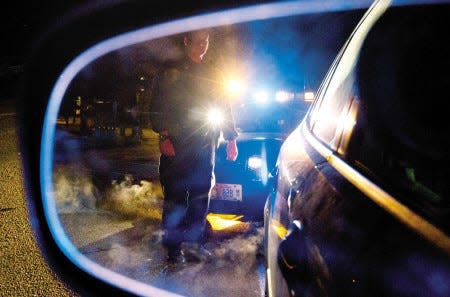NH bill would hit drivers who refuse alcohol level tests with tougher penalties
CONCORD — If you get pulled over on suspicion of drunken driving, you might want to take that Breathalyzer: New Hampshire lawmakers are considering a bill that would double the penalties for drivers who refuse to consent to testing to determine blood alcohol levels.
Senate Bill 418, sponsored by Sen. Bill Gannon, R-Sandown, would increase the first-time penalty for drivers arrested for any violation or misdemeanor who also refuse to submit to tests to determine blood alcohol levels from an administrative license suspension of 180 days to one year. Repeat offenders would see the now two-year suspension increase to three years.

The bill would establish this penalty for refusing a physical test or one of blood, urine or breath as designated by the officer.
However, if the arrested person agrees to take a test, their penalty would remain at the original 180-day suspension.
Currently, drivers face the same 180-day administrative license suspension whether they take the test or refuse. They can appeal this suspension to the DMV within 30 days of the arrest.
The bill also creates the possibility of suspending the penalty of a mandatory jail sentence in favor of a substance use disorder evaluation for a person convicted of an aggravated DWI if they agree to take a blood alcohol level test. An aggravated DWI is when there is an additional factor present that makes the action of driving under the influence even more dangerous or reckless, like driving 30 mph over the speed limit or causing a serious accident.
As originally written, the bill would’ve set maximum THC concentration levels in anticipation of possible cannabis legalization in New Hampshire. But Gannon said that bill will now be for “next year.”
The bill as amended passed the Senate in March.
Proponents call for deterrence, but opponents say penalty is too high
Gannon said, according to the attorney for the New Hampshire Department of Safety, seven out of every 10 people arrested for DUI in New Hampshire refuse a chemical test.
“It’s unacceptable,” Gannon said. “We must continue to be proactive in New Hampshire to keep our state one of the safest in the nation on the roads.”
Eddie Edwards, assistant commissioner of the Department of Safety, testified at the House hearing that this legislation is one of the department's top priorities this year.
“This legislation is part of a broader public policy to make sure that we ensure roads are safe for travel,” he said. "We’ve had a number of deaths on our roadways, and we get an enormous amount of interactions with families who lost loved ones asking what New Hampshire is doing.”
Chris Casko, the administrator of hearings at the Department of Safety, said New Hampshire has historically had a high rate of refusal for submitting to a chemical test. This bill, he said, would help reduce that rate of refusal and therefore increase public safety.
“The data would suggest that making a more significant license suspension penalty will encourage people to take a chemical test after they are charged with DUI,” he said. He pointed to Vermont, which he said has a much higher suspension period.
No more "kill the ump": NH bill to protect sports officials gains support
Lt. Chris Storm, commander of special services for New Hampshire State Police, added that generally, the states with lower penalties have higher refusal rates. He said this bill would put New Hampshire on par with other states, some of which have suspension as low as 90 days and some up to a year.
Robert Moses, a lawyer from Amherst, said that the increase in penalty would have a ”draconian” effect on New Hampshire citizens. He was testifying against the bill on behalf of the New Hampshire Defense Lawyers Committee.
“The problem is that the first offender, particularly someone with no prior record of any kind, or any history of alcohol offenses, or interaction, when they have their license taken away for a year, that has tremendous collateral damage potential,” Moses said. “People lose jobs, when jobs are lost families can’t be supported and houses are lost to foreclosure, in a time when we’re all having economic difficulties as it is, and what’s worse is that even if the individual is ultimately exonerated in court, it currently has no impact on the ALS [license suspension] punishment.”
He said he’s seen many cases where a person was falsely convicted of driving under the influence but was still left with a suspension of six months. A year, he said, would make that scenario even worse. He would like to see a change to the system in which the administrative license suspension is eliminated for a motorist found not guilty.
A spokesperson for the American Civil Liberties Union of New Hampshire said it has not opined on this bill.
The House Criminal Justice and Public Safety Committee will vote on whether to recommend the bill on April 19. It will then head to the full House floor for a vote.
This article originally appeared on Portsmouth Herald: NH bill would crack down on drivers who refuse alcohol level tests
